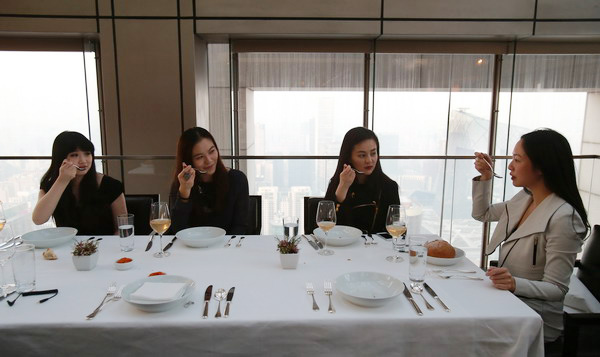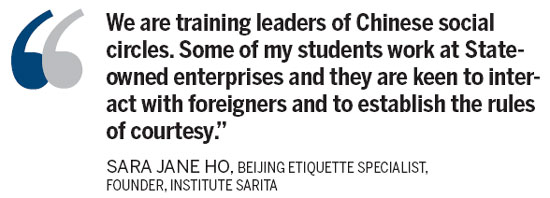

Chinese businesswomen seek international sophistication as they go abroad more often
Fashion consultant Jiang Zaozao didn't feel confident when dining at Western restaurants until recently.
"Most of the time I didn't really know how to use a fork properly or which knife to use to cut meat," said the 30-year-old Beijing socialite, who has frequent meetings with executives and designers from Europe. "I want to feel good about myself and be respected by my friends."
|
 Sara Jane Ho (right), an etiquette specialist,demonstrating to her students the etiquette of dining at a Western restaurant at Park Hyatt Hotel in Beijing. [Photo / China Daily] |
A recent course to teach Chinese nouvelle riche women etiquette has boosted Jiang's confidence. She learned European etiquette through real-life practice, from handshaking, folding napkins and how to walk elegantly in heels.
Sara Jane Ho, a Beijing-based etiquette specialist and founder of Institute Sarita, brought what she learned from Switzerland's last traditional finishing school to China to create Western-style table manners, business etiquette, appropriate dressing and hostess skills.
A native of Hong Kong, Ho left at an early age to attend Phillips Exeter Academy, an elite boarding school in the United States. She graduated from Georgetown University and earned an MBA from Harvard Business School.
After Harvard, Ho went to Swiss Institut Villa Pierrefeu, where she was inspired to start teaching etiquette in China. Of a class of 30 students, there are only two or three Europeans. Most of them were from developing countries, she recalled.
As China's economy grows, Chinese citizens are getting richer, creating an explosion in Sino-foreign exchanges on citizen-to-citizen levels in recent years, Ho said.
Negative media reports and shared stories from her overseas friends about Chinese misbehaving abroad prompted Ho to bring the concept of etiquette to China. "I want to empower people to become etiquette-aware," she said. "Even I know I will only influence a few people. I do believe if they go on to change people around them we can create an etiquette movement."
Her school currently only recruits female students. Most of them are second generation rich or wives from wealthy families and some are top business professionals from the private sector and even State-owned enterprises.
"We are training leaders of Chinese social circles. Some of my students work at State-owned enterprises and they are keen to interact with foreigners and to establish the rules of courtesy," she said. "To me it is very promising. The fact the individual is so interested in learning is a very positive sign for the Chinese economy."
Ho said her school will teach her students about self conservation and help them understand why they do what they are doing." Some people are not aware of their actions and cause offence because they haven't been taught the framework and references for what etiquette is," she said.
"We are teaching, not lecturing. It is a daily practice or a rehearsal," she said. "Students become accustomed to use and apply etiquette in everyday life so it becomes second nature. Practice makes perfect."
She gave an example, placing a knife blade on the plate in front her. "The knife blade is sharp. You don't want to face your neighbor with it. Behind every seemingly superficial move is a Chinese value of consideration and selflessness."
Ho said her school is also developing courses to include Chinese culture such as preparing tea and calligraphy.
"We want our students to be mindful that Chinese culture is the most elegant culture," she said. "All those values are deeply rooted in Chinese culture."
|
 |
Ho's student Jiang said learning Western etiquette shows respect for people around her. "Many people talk about Chinese misbehavior. But if you start behaving yourself, other people will not feel easy being rude to you," she said.
Butler service
When Christopher Clark opened the Ritz-Carlton in Sanya, in South China's Hainan province, he selected 12 people to form the first butler team in the country's most famous island resort.
The Chinese butlers learned how to serve tea, how to pack a suitcase and how to handle bookings for guests staying at their luxury villas and executive lounges.
Guests, including chief executive officers and senior business professionals, like such personal attention. "A butler is your personal assistant in the hotel and forms a relationship with guests," said Clark, who is to be the general manager of The Ritz-Carlton in Chengdu, which will open this summer.
The nature of butler service is understanding and trust, said Clark. "In a room with a lot of tension, you have to be intuitive and think for the guests," he added. "It is about being available when the guests want you there and not being there when they want privacy."
The craftsmanship of a butler lies beyond skill and experience. "We are looking for the attitude of an individual," he said. "We can teach them skills through training, but can they think? Can they anticipate? Are they confident enough? These are to do with their attitude."
The increasing number of wealthy Chinese traveling abroad has broadened their minds to Western types of service. They appreciate they can find the same level of experience in their hometowns now, Clark said.
The increase in service levels has been gradual over a span of about five years. In the last two to three years demand has accelerated owing partly to the number of five-star-plus luxury hotels opening in China, said Josephine Ive, principal of Magnums Butlers International, an Australian butler-training provider. Her client list includes luxury hotels and resorts along with several yacht-owner clients in Asia.
Ive observed butler services are mostly required by luxury hotels, certain private individuals and corporate clients.
"The position of butler provides a very personal, detailed, seamless service," she said. "Both hotels and corporate clients are looking for that personal attention from their butler. In turn, the butler becomes more of a personal assistant and very often indispensable."
Stylist
Former deputy Mayor of Los Angeles Joy Chen visited China at the end of last year. Chloe Jiang, a stylist from Hong Kong, dressed her every day for nearly a month. Jiang started to select clothes one month ahead of her arrival, according to Chen's schedule.
All her clothes and shoes were documented and matched for different occasions. "Businesswomen cannot carry boxes of clothes and shoes and change outfits at every single event," Jiang said. "But we can change through some alterations in hairstyle, makeup and even accessories to mark a change in professional elegance at business meetings to charm and glamour at banquets."
Jiang began her career dressing actors and celebrities, expanding to style requests from business professionals in the finance and legal sectors.
Most business professionals are highly educated, hold management positions and have an international background, requiring fashion and style advice for business meetings, cocktail parties, dating and even traveling. "They want to make sure they dress properly and with style at every moment," she said.
Part of her job is to purchase ideal luxury goods. Despite the increasing buying power within the Chinese mainland, many of her clients do not know which brand or which items to purchase. "They have many questions when approaching luxury brands. They don't want to be labeled intensive. They come for me for advice," she said.
wangzhuoqiong@chinadaily.com.cn